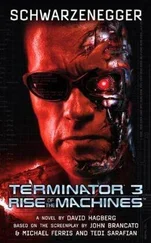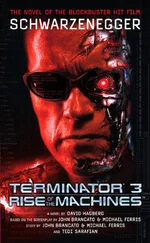Otto called him. “Are you caught in that mess?”
“Right in the middle of it.”
“I have a Gulfstream standing by with its crew, and your things are already on board. Do you want to get off the highway somewhere? I can send a chopper for you.”
“How soon do we need to be airborne to beat the Air France flight?”
“We have all morning, but you might run into some trouble with the DGSE. It’s possible they won’t let you off the plane.” It was France’s primary intelligence agency.
McGarvey and Otto — but especially McGarvey — had a sometimes bloody history in France. The French intelligence people had long memories. Although he had been of some service to them at one point or another, trouble always seemed to develop around him.
“That’s something I’ll have to deal with when I get there.”
“Do you want me to call Walt, see if he can pull a few strings?”
McGarvey thought about it. “No,” he said.
“Okay, are you trying to tell me something?”
“I don’t know. But she and Schermerhorn said that whatever is going on— has been going on since oh two — is bigger than we can imagine, and they’re both frightened out of their wits. Five people have already lost their lives over this thing. Alex has gone runner, and Schermerhorn took the huge risk to change the inscription on panel four. And yet they won’t come out and say what the hell they saw buried in Iraq.”
“I can think of a lot of possibilities,” Otto said after a beat. “None of them pretty and at least one so political, the fallout would be more than bad.”
“Bad enough to kill for to keep it quiet,” McGarvey said. He knew exactly what Otto was talking about. He had thought about it since he and Pete had gone to Athens to talk to Larry Coffin.
His biggest problem was reconciling what he thought with what he thought he should do about it.
Traffic finally began to move, and a half hour later he was at the Andrews main gate, where he was expected and waved through.
He drove across the field to where the Navy’s C-20H Gulfstream, which the CIA borrowed from time to time, was waiting in its hangar, the forward hatch open, the boarding stairs down.
A chief petty officer directed him to park his Porsche off to the side, at the back of the hangar, and the jet’s engines spooled up.
“Your partner is aboard with your things, Mr. Director!” the chief had to shout.
“Thanks!” McGarvey said, knowing exactly who it was and why.
The pilot turned in his seat when he came aboard. “Soon as you’re strapped in, we’ll get out of here. We have immediate clearance.”
“Give me a minute,” McGarvey said, and went back to where Pete was seated, sipping from a bottle of mineral water.
“Before you start bitching at me, Blankenship assured me Schermerhorn was secure,” she said.
He supposed he was happy to see her, but he was vexed. He worked alone; it’s the way he liked it. But Otto had helped him almost from the start. And so had Louise, and his daughter and his son-in-law. And Pete had helped him a while ago in an operation that had gotten her shot. And here she was again, in love with him.
The flight attendant, a young petty officer, first-class, came back. “Sir?” she asked.
“Button up and let’s get out of here. And as soon as possible I want a very large cognac.”
Over the past few hours the images on Otto’s main monitor had begun to change in a way that was significant to him, and he was unable to stay seated now that he knew he was coming close. He bounced from one foot to the other, something he did when he was excited.
The 120-inch extremely high-def OLED flat-screen mounted on the wall above one of his desks was visible from anywhere in his primary office, but he had to look away from time to time or he knew he would explode.
He was always the odd duck. And when he was a kid in Catholic school, his classmates teased him unmercifully. And sometimes, after school and on the weekends, a few of the class bullies who’d singled him out would beat him. One time they’d broken a couple of ribs, another his nose and even his arm, and one winter his left leg — which still ached on rainy days.
It was impossible for him to go to the nuns about it, because they didn’t like him either. By the age of six or seven he was already smarter than they were in just about every subject — especially in math and science. But instead of treating him like a prodigy, they called him a liar. He was already solving college-level mathematical equations in his head, and they accused him of simply parroting the words and symbols he’d seen on paper. They’d never bothered to call someone who knew the math to check him out, because they were afraid of him. Instead of being proud of the genius they had in their classrooms, they were scared silly, mostly because he was already questioning the basic tenets of the faith, and they knew if he learned too much too soon, he would become an atheist and they would have failed as teachers.
It was just about the same for him in high school and even in college, because he’d developed the unfortunate habit — which he later managed to break — of laughing at people who couldn’t just “get it.” He had the tendency to solve problems they were grappling with and telling anyone who’d listen how stupidly easy they were.
He’d finally dropped out in his third year, and he spent several years of intense reading — not studying because he could “get it” just by reading — supporting himself by cooking in restaurants and any number of other jobs where he didn’t have to use his brain. But each time, he was fired because whatever he was doing, he did it better than the boss.
At one point he went to work for a Catholic diocese, running its books and doing some teaching, but by then he had discovered sex in a big way, and he was fired because he had not only seduced the dean’s twenty-year-old daughter but the dean’s nineteen-year-old son as well.
And then he came to the attention of the CIA.
Some letters and even scraps of words were beginning to emerge when his phone chimed softly. But it wasn’t Mac. The call was internal, ID blocked. He answered anyway, though the interruption just now was irritating.
“What?”
“Good morning. Marty asked that I check in to see what progress you were making.” It was Tom Calder, the assistant director of the national clandestine service. Bambridge had no idea how to deal with Otto, so he had taken to sending Calder to talk to him.
“I’m slammed down here, Tom. Tell him I’m being a bastard.” In Otto’s opinion, he was one of the smarter guys on campus.
Calder chuckled, his voice, like his manner, soft, even gentle, but refined. “I know, and I apologize, but I’d like come down for a chat. I’ll make it brief; we don’t want him going ballistic on us now.”
“Okay,” Otto said. He hung up and sat down at his desk, facing the big monitor.
Just about everyone in the CIA was ambitious. Everyone worked hard at their jobs; there was no doubt about it. But a lot of them worked just as hard at securing their career paths. Everyone wanted promotions, not only for the money, but for the prestige, for the increased power. The flavor of the intelligence business had always been the thrill of knowing something the general public hadn’t an inkling of.
Calder was no different than most of them. He wanted to take over and run the directorate the way he thought it should be run. He was doing that by making the clandestine service look so good, Marty would be promoted. Calder would be the logical choice to fill the vacancy.
In that much, at least, Otto agreed. Although Calder was in his late fifties, and starting to get a little old to run a directorate — by now he should have been the assistant director of the entire CIA — he would have done a much better job running the spies overseas than Marty had ever dreamed of doing.
Читать дальше












